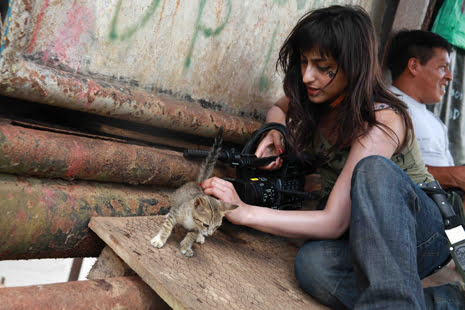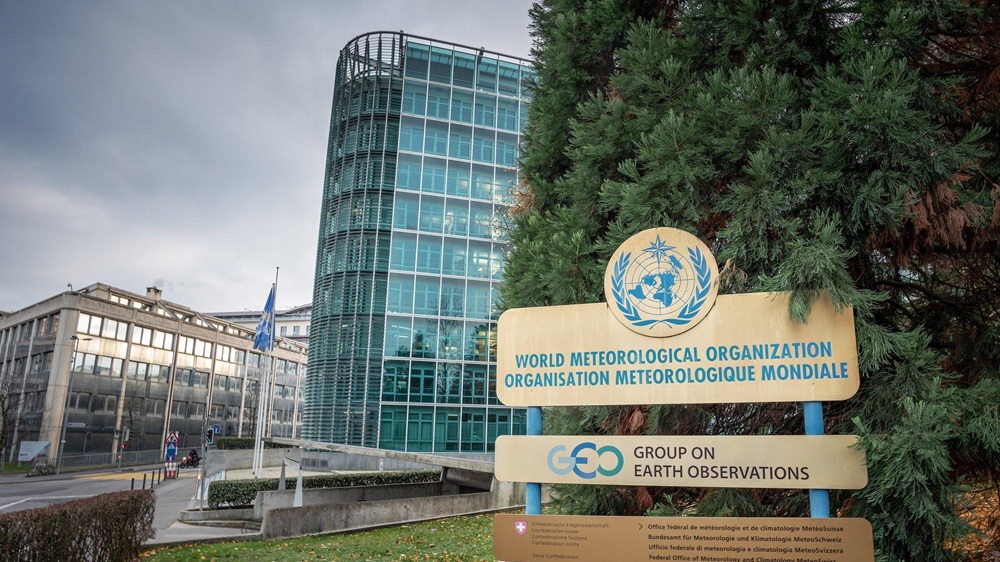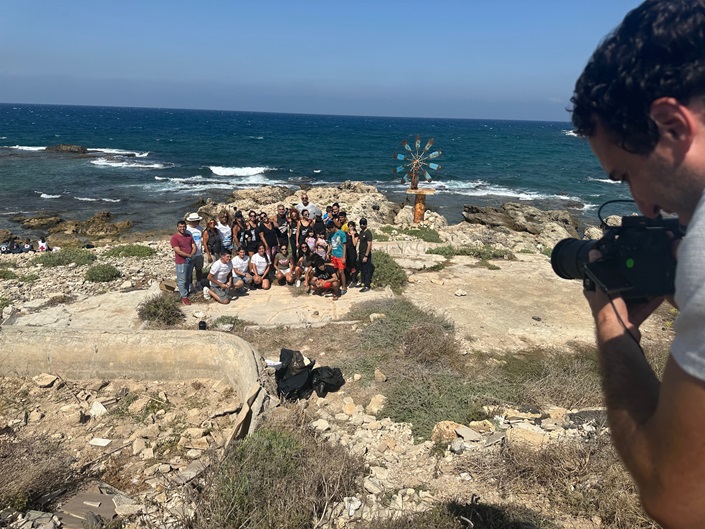
THE LEVANT NEWS EXCLUSIVE - Interview conducted by Emad El-Din Aysha --
Dear Sarah Begum, before anything else, could you fill us in on your background please? Where did you grow up and how did this shape your life and career? Did you grow up watching David Attenborough and Michael Woods, for instance?
I was born in Central London, opposite the Houses of Parliament so maybe this affected my later interests in life. I grew up as a tomboy and always felt my thoughts, interests and ideologies were very different to that of my peers although I mixed with friends of all backgrounds, faiths and cultures – this injected a curiosity about the world in me. My father was an avid watcher of wildlife documentaries featuring David Attenborough so I’d enjoy watching programmes of wild cats hunting except he shared the fear of snakes with Indiana Jones – one which I inherited yet had the opportunity to face a couple of times later on in life. My brother took me on a road trip from New York City to the Niagra Falls in Canada when I was 17. On this route, we passed through the Amish towns in Pennsylvania where I met people who till this day live without electricity, farm on their land and travel by horse and carriage. I was fascinated by what else could exist out there. I was always different. Didn’t always fit into a specific group yet was accepted everywhere. My passions blurred all stereotypes and I was on a journey to find out who and what I was. It was only when I embarked on the Amazon expedition to make my first documentary living with the Huaorani tribe deep in the jungle of Yasuni National Park, that I realised what my purpose was.
How many languages do you speak and how long does it take to get familiar with a subject and a culture?
I speak several languages; English (native tongue), Bengali (mother tongue), Spanish (conversationally fluent), French (conversational), I can read Arabic and make out sentences in various other languages including Huao Tererro (Amazonian dialect). For me, I like to make instant connections with people by immersing into a culture so I would like to think that it doesn’t take much time at all although you have to be open. Without the openness, you cannot embrace the culture in all of its authenticity.
Does having a Third World background, not being white, help when it comes to making anthropology documentaries? Are people more receptive and open and trusting?
I have had many instances around the world where I manage to blend in, communities from South America, Asia to the Middle East telling me that I look like I belong to their race. This has been handy for me in many of my adventures and made it easier for me to gain access and trust when it comes to my investigative stories.
You’re first documentary was Amazon Souls. Is making an anthropology documentary different than a regular news documentary?
I think making an anthropological documentary is different in the sense that you focus more on the culture so the observations will be specific, longer and detailed yet a news documentary can be about a certain issue, focuses on the highlights and can vary in length.
You’re an accomplished documentary maker, something we’re not terribly good at here in the Arab world. (We always have somebody speaking with a stiff, classical Arabic voice in the background or have an equally stiff historian talking about something, such as architecture, without even pointing at the thing). Did you learn documentary making at the BBC?
I’ve heard this a lot from Directors recently wanting to see fresh faces and a refreshing framing of documentaries through the diversity of presenters used. The thing is, the Commissioning Editors of the respective countries in any country whether here in the UK or the Arab world need to be open when it comes to choosing presenters for the programme. There is a conscious need for serious change in this area. I was mentored by BBC Directors and Editors on how to make industry standard documentaries using BBC scripts and programmes that they had worked on as my case studies and examples. Their goal was so that I would master my craft so I have a lot to thank David Neil Johnson and Simon Thorne for the making of me.
Is it all training or does it take a certain natural predisposition? Do you have to be relaxed in front of the camera? Does taking courses in acting and theatre help?
I never took courses in acting or theatre but of course, however, as an actress now, I can say that it does help. Yet, they are two different ball games. You have to be relaxed and natural in front of the camera for it not to look awkward as the camera sees everything. Practise really does makes perfect. I was told by an industry Producer that I was a natural Presenter and it was something that I should hone my skills in and set myself up as. Then everyone else identified this trait in me and so I accepted it and realised that I actually really enjoyed it – but because my focus was elsewhere – on my subject and the story I was telling. I liked the fact that my style could show different sides of people – one not many other journalists can get to the heart and soul of. I have a special connection with people, and this is what people enjoy in watching my work.
Tell us about ‘The Adventuress Club’?
I co-founded The Adventuress Club with Russ Malkin of Big Earth to inspire more women on adventures and promote the idea of female explorers because there are not many. I also think women should unite and come together to share their ideas, passions and work and help one another. It’s the only way forward in the world that we live in.
Now let’s talk politics. Is anthropology necessarily an act of advocacy?
No, not necessarily. Anthropology is the study of humankind. However, it does help you to understand a culture concerned for you to then shape your strategies accordingly when advocating for them and in their best interests. Quite often, Westerners think they know what’s best for a Third World country in crisis of any sort without having experienced life in their shoes. I like to immerse myself fully, connect and understand what’s really needed. I’m also very good at generating ideas to provide solutions to problems and I use this on my advocacy.
What do you think of the ‘reforms’ taking place in Saudi Arabia, allowing women to drive cars?
I think it’s a great thing to allow women in Saudi Arabia to drive cars and it should have happened a long time ago. Think about it. Where do we all come from? Our mothers, right? Young mothers are having to take care of their families and may also be trying to balance it with their professional careers so allowing them to drive will help them manage their priorities, take care of their families and their own lives better whether it’s driving to the grocery store, to pick up the kids or to work. If we dig deep into history, the Prophet Muhammad’s (PBUH) first wife Khadija was a widow of a wealthy merchant, inherited his wealth and became a revered and successful businesswoman. I’m sure she illuminated signs of independence in certain areas of her life in order to run that empire. And here’s a fun fact – SHE proposed to the Prophet. I wish to see equality all over the world. It’s the best way forward – to walk the middle path. A life of balance.
You’re parents are from Bangladesh originally. Do you feel the plight of the Rohingya Muslims is not getting enough international attention and, if so, how would you go about fixing this situation?
My cousin was on his way back from a humanitarian mission where he distributed aid to help the Rohingya Muslims and died in a crash with a group of his friends when their car was hit by a bus. I think this issue needs more attention internationally and although it would be very emotional for me to make that journey, if the right opportunity presented itself, I would go and document their stories and help however I can.
What do you think of President Trump’s position on Syrian refugees? And why do Europeans insist on describing Syrian refugees as ‘migrants’? Is language part of politics and can documentary making help fix this?
I like to see myself as politically neutral although I do have my personal opinions. It breaks my heart to see the crisis in the Middle East spiral out of control and into war. It’s no fault of the Syrians that they crave a better life elsewhere far from the war-torn country they are forced to call home. However, I always wondered why neighbouring stable Arab countries in the Middle East didn’t open their borders and arms to help the Syrian refugees. I think this is what many have questioned. The definition of a ‘migrant’ is the following: a person who moves from one place to another in order to find work or better living conditions. So, I don’t think it’s a negative term at all as long as people are aware of what they have escaped and where they desire to be. After having delivered workshops on entrepreneurship in the “Calais Jungle” to refugees from the Middle Eeast; Syria to Sudan, I realized that we really need to connect with people to understand them and their situations on a deeper level. It’s best for shaping policies, social structures and even dealing with them going forward in this current crisis we have.
You’ve also done great work documenting the plight of the Native Americans in the US. Are there lessons to be learned from this for the Palestinian cause? Particularly when it comes to engaging an international audience?
I often compared the Native Americans to the Palestinians. Hundreds of years ago, the Native Americans were forced out of their homes and fertile lands by white European settlers. It was a battle of the gun against the bow and arrow. For centuries, man has been fighting for land everywhere and that’s how civilizations were conquered, erased and created. It boggles my mind to think that men are capable of this time and time again. What would happen if we had more women leaders in our world – where would the focus lie then? I think the struggle for power is indented in our DNA and through the evolution of our species both in mind and in policy, we can create a peaceful world. Call me an idealist but I truly believe in peace and will strive to achieve it through everything I do. They are native indigenous peoples of America. The fight for land in Palestine is similar yet different in many ways. If we can understand that people are all the same inside, we have hearts that beat and bleed in the same shade of red and carry hopes, dreams and responsibilities for the sake of our very survival, then people will relate and people can turn things around. There needs to be dialogue, connection and understanding. From this, everything else will take its course. The international media needs to show this process and so the international audience can understand it. If we are so used to being fed news in the same formats, we start to question it if it comes wrapped up in a different way. We need to consume different kinds of media and showcase all kinds of voices for a balanced representation of our world. There needs to be unity. That’s my mission.
What are your future plans? Which war-torn part of the world are you heading to next?
To continue in my journey as an Explorer, International Journalist, TV presenter and tell stories that matter, hoping to make positive impacts and make a difference wherever I leave a trail. The world has always been a board game to me so it’s always where the dice falls – my destination is unpredictable. I am very interested in the ancient civilizations and where history has left its marks, specifically in the Middle East now. Maybe even Lebanon. Who knows? Let’s see where my adventures take me next…
http://sarahbegum.tv/
https://m.facebook.com/sarahbegumtv/






